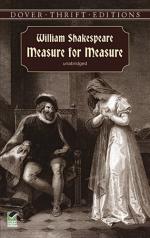|
This section contains 4,052 words (approx. 14 pages at 300 words per page) |

|
SOURCE: "The Inner Conflicts of Measure for Measure: A Psychological Approach," in The Centennial Review, Vol. XXV, No. 3, Summer, 1981, pp. 266-76.
In the following essay, Paris applies the psychological theories of Karen Horney to Shakespeare's Measure for Measure, seeing in the character of the Duke and in the work's "implied author" a conflict of perfectionism and self-effacement.
I
Measure for Measure is a play of which I cannot make sense thematically. It begins by stressing the corruption in Vienna and the need for a stricter enforcement of the law, but it ends by celebrating mercy and forgiveness and perpetuating the conditions which have led to license in the first place. The demands of justice and of mercy are not reconciled; for everyone is pardoned, including the unregenerate murderer, Barnardine. Though the play is thematically puzzling, we can make sense of it, I believe, if we see it as...
|
This section contains 4,052 words (approx. 14 pages at 300 words per page) |

|


